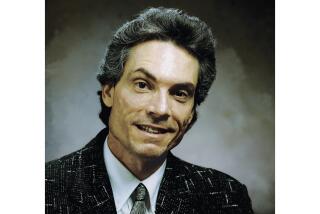‘The Source’ a Reverent Ode to Beat Founders
- Share via
Jack Kerouac never seemed to enjoy any of the liberating benefits of the social revolution he helped foment. Fatally stung by critics like Truman Capote (“It’s typing not writing”), who scorned the stream-of-consciousness excesses of his “On the Road,” Kerouac followed early successes by soldiering through a number of undistinguished works, finally succumbing to alcohol-aggravated illness in 1969.
William S. Burroughs, meanwhile, shot dope, shot his wife and blew a few holes through national self-satisfaction with such novels as “Naked Lunch,” “Junky” and “Queer.” Allen Ginsberg? Before his death two years ago, he’d become nothing less than a third link in an American poetic tradition that includes Walt Whitman and William Carlos Williams.
Kerouac, Burroughs and Ginsberg (New England mill-town kid, Midwestern heir and Jersey Jew) had lives as unlikely as their friendships. But from the time of their meeting at Columbia University in the ‘50s until their respective deaths, they changed the world with words. And they are the source of Chuck Workman’s “The Source,” an ambitious and largely successful documentary testimony-tribute to the founders of the so-called Beat movement.
Workman’s thesis is that the relatively subdued Beat-poetic upheaval of the ‘50s helped create the massive unrest of the ‘60s, and that its echoes are heard today. It’s tough to argue with him, even before he makes his case. But make it he does--even if his entire film is about myth making, and his subjects’ lives were about shattering myths (poetry, politics and/or sex). It may be incumbent upon “The Source” to take its various subjects--who include Lawrence Ferlinghetti, Michael McClure, Amiri Baraka, Ed Sanders and Gregory Corso--seriously. But one can only imagine Ginsberg smiling beatifically over the profundity of it all.
Workman is the beneficiary of what he admits was an enormous amount of cooperation in getting rights to various clips and songs; much of the time he uses only snippets of material but the cumulative effect is rich. And pointed: Television coverage of the Beats--from ‘50s news material to a William F. Buckley interview with Kerouac to the likes of Deborah Norville smugly reporting on emerging interest in the movement and its poetry--points up not only the disposable quality of TV news, but its inherent shallowness and unfailing ability to miss the point.
If “The Source” falters, it’s in the dramatized readings by its star attractions--Johnny Depp (as Kerouac), John Turturro (as Ginsberg, reading “Howl” on the grounds of the Rockland County mental hospital where the poet was briefly treated) and Dennis Hopper as Burroughs. Only the latter works at all--it is typecasting, after all, and typecasting often works. But all three feel like interruptions to an otherwise graceful and poignant tribute to perhaps the three bravest cultural figures of the past 50 years, particularly Ginsberg, whose value as a writer, cultural witness and social gadfly can’t be emphasized enough, even by Workman.
* Unrated. Times guidelines: vulgarity, scenes of drug use.
‘The Source’
Winstar Cinema presents a film by Chuck Workman. Written, directed, produced and edited by Chuck Workman. Executive producer Hiro Yamagata. Cinematographer Tom Hurwitz. Music Phillip Glass, Dizzy Gillespie, Thelonious Monk, the Doors, the Grateful Dead, Bob Dylan, Stan Getz, Gerry Mulligan, Ornette Coleman, the Rolling Stones, Sonic Youth, Natalie Merchant, David Amram. Running time: 1 hour, 29 minutes.
Exclusively at the Nuart Theater, 11272 Santa Monica Blvd., West Los Angeles, (310) 478-6379; University 6, 4245 Campus Drive, Irvine, (949) 854-8811.
More to Read
Only good movies
Get the Indie Focus newsletter, Mark Olsen's weekly guide to the world of cinema.
You may occasionally receive promotional content from the Los Angeles Times.









